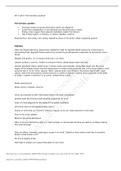Biod 152 ap ii lab - Study guides, Class notes & Summaries
Looking for the best study guides, study notes and summaries about Biod 152 ap ii lab? On this page you'll find 11 study documents about Biod 152 ap ii lab.
All 11 results
Sort by
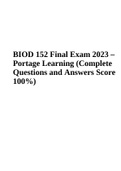
-
BIOD 152 AP 2 FINAL 2023 (Human Anatomy and Physiology Questions and Answers 100%), BIOD 152 Final Exam 2023 and BIOD 152 M4 Exam Human Anatomy and Physiology II with Lab (Portage Learning) Score A+ 2023 (Best Guide 2023-2024)
- Package deal • 3 items • 2023
-
- $40.49
- 1x sold
- + learn more
BIOD 152 AP 2 FINAL 2023 (Human Anatomy and Physiology Questions and Answers 100%), BIOD 152 Final Exam 2023 and BIOD 152 M4 Exam Human Anatomy and Physiology II with Lab (Portage Learning) Score A+ 2023 (Best Guide 2023-2024)

-
Portage Learning BIOD 152 A&P 2 Lab 1 Exam
- Exam (elaborations) • 16 pages • 2024
- Available in package deal
-
- $8.00
- + learn more
Portage Learning BIOD 152 A&P 2 Lab 1 Exam
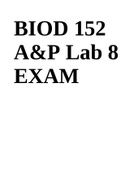
-
BIOD 152 A&P Lab 8 EXAM
- Exam (elaborations) • 12 pages • 2022
-
- $5.99
- + learn more
BIOD 152 A&P Lab 8 EXAM. The two body systems described together as the urogenital system are: Reproductive and Urinary Digestive and Urinary Reproductive and Digestive Urinary and Metabolic None of the above **CAN ALSO ASK: The kidneys are responsible for: A. Filtration B. Red blood cell production C. Digestion D. Control of body communication E. A&B F. C&D Question 2: Urine that has a sweet odor is indicative of: Multiplication of bacteria Diabetes Urea breakdown to ammon...
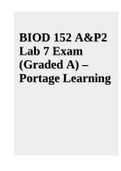
-
BIOD 152 AP2 Lab 7 Exam (Graded A) – Portage Learning
- Exam (elaborations) • 13 pages • 2022
-
- $5.49
- + learn more
BIOD 152 AP2 Lab 7 Exam (Graded A) – Portage Learning Which of the following statements is true concerning the male gamete cell? It is the largest cell in the body. It can be seen with the naked eye. It allows for gametes to have motility. It contains a large amount of nutrients.
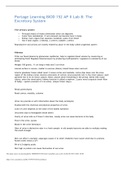
-
Portage Learning BIOD 152 AP II Lab 8: The Excretory System
- Case • 6 pages • 2022
-
- $12.49
- + learn more
Portage Learning BIOD 152 AP II Lab 8: The Excretory System The Urinary system • Principal means of waste elimination other are digestive • Come from metabolism. If not removed can become toxic in body • Kidney main organs that separate metabolic waste from blood • Has 6 total organs: 2 kidneys, 2 ureters, bladder, urethra Reproductive and urinary are closely related by place in the body called urogenital system Kidneys Filter our blood plasma by glomerulus capillaries; h...
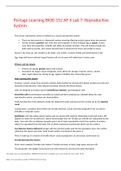
-
Portage Learning BIOD 152 AP II Lab 7: Reproductive System
- Case • 5 pages • 2022
-
- $14.49
- + learn more
Portage Learning BIOD 152 AP II Lab 7: Reproductive System The human reproductive system is defined as a sexual reproductive system: • There are two parents or a biparental system meaning offspring receives genes from two parents • Parents produce gametes (sex cells) that meet together to form fertilized egg or zygote. Games must have two properties: mobility and ability to provide nutrients. One cell cannot provide one; both need to provide. One cannot because then it would be too he...
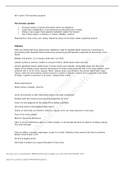
-
BIOD 152 AP II Lab 8: The excretory system (Portage learning)
- Exam (elaborations) • 6 pages • 2021
- Available in package deal
-
- $14.49
- + learn more
BIOD 152 AP II Lab 8: The excretory system (Portage learning)/BIOD 152 AP II Lab 8: The excretory system (Portage learning)/BIOD 152 AP II Lab 8: The excretory system (Portage learning)/BIOD 152 AP II Lab 8: The excretory system (Portage learning)/BIOD 152 AP II Lab 8: The excretory system (Portage learning)/BIOD 152 AP II Lab 8: The excretory system (Portage learning)/BIOD 152 AP II Lab 8: The excretory system (Portage learning)/BIOD 152 AP II Lab 8: The excretory system (Portage learning)/BIOD...
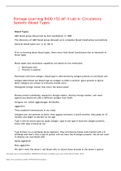
-
Portage Learning BIOD 152 AP II Lab 6: Circulatory System: Blood Types
- Case • 4 pages • 2022
-
- $14.49
- + learn more
Portage Learning BIOD 152 AP II Lab 6: Circulatory System: Blood Types Blood Types ABO blood group discovered by Karl Landsteiner in 1900 The discovery of ABO blood group allowed us to complete blood transfusions successfully General blood types are: A, B, AB, O Prior to learning about blood types, there were fatal blood transfusions due to mismatch of blood types Blood types and transfusion capability are based on two molecules: 1. Red blood cells 2. Proteins in plasma Red b...
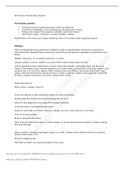
-
BIOD 152 AP II Lab 8
- Other • 6 pages • 2021
-
- $8.49
- + learn more
The Urinary system · Principal means of waste elimination other are digestive · Come from metabolism. If not removed can become toxic in body · Kidney main organs that separate metabolic waste from blood · Has 6 total organs: 2 kidneys, 2 ureters, bladder, urethra Reproductive and urinary are closely related by place in the body called urogenital system Kidneys Filter our blood plasma by glomerulus capillaries; help to regulate blood volume by conserving or eliminating fluid; Regulat...
BIOD 152 AP II Lab 8: The Excretory System

$6.50 for your textbook summary multiplied by 100 fellow students... Do the math: that's a lot of money! Don't be a thief of your own wallet and start uploading yours now. Discover all about earning on Stuvia



